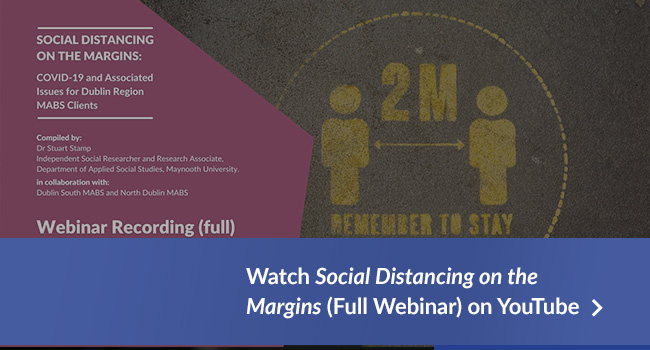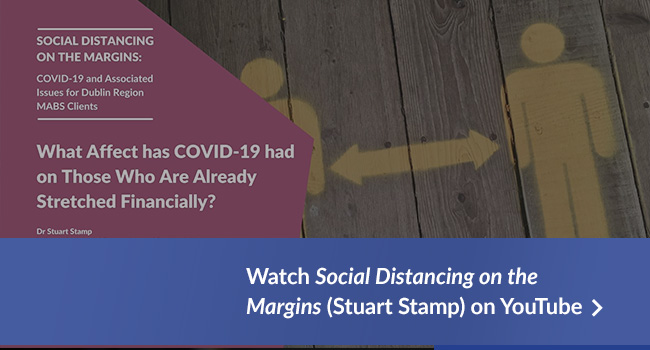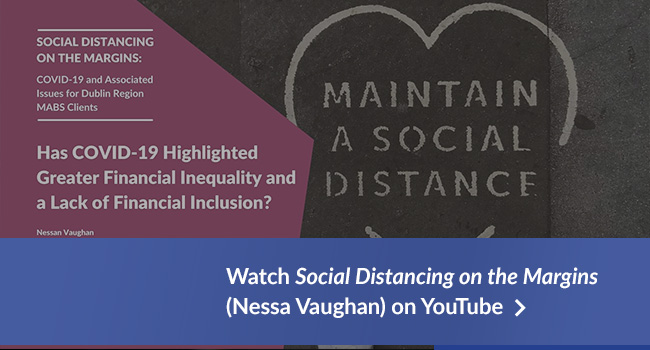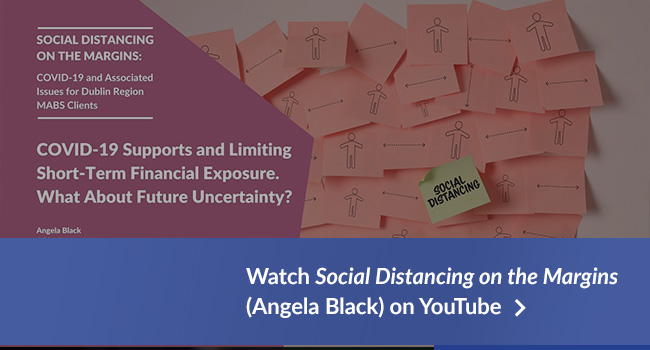Social Distancing on the Margins: COVID-19 and Associated Issues for Dublin Region MABS Clients
The impact of Covid-19 for MABS clients living on the margins in Dublin
Covid-19 has changed the way we all work, and this includes the delivery of the services offered by MABS to the public. National health guidelines now require remote service delivery by phone or email. While remote engagement works for many MABS clients who have adapted well and can use electronic forms of communication, it can inadvertently marginalise those more accustomed to in-person or ‘drop in’ access.
In light of these concerns, Dublin South and North Dublin MABS undertook to investigate how the pandemic has affected MABS clients in Dublin. The report Social Distancing on the Margins: COVID-19 & Associated Issues for Dublin Region MABS Clients was compiled by Stuart Stamp, Research Associate, Department of Applied Social Studies, Maynooth University. The research was conducted from March to June of 2020.
The report was launched on March 26th by Angela Black, Chief Executive, Citizens Information Board. She pointed to the fact that research both by MABS and others bodies, highlights a very low level of ‘financial resilience’ among certain cohorts in Ireland.
The 2020 TASC report on ‘Exploring Household Debt in Ireland’ noted that 32% of low-income households in Ireland struggle to meet everyday living costs as they are consistently failing to meet debt repayments as they fall due. This rises to 36% for single-parent households and 40% for the unemployed.
“This report highlights that Covid 19 and the resultant economic situation will likely exacerbate these statistics. The low level of financial resilience and precarity amongst households in Ireland needs to be continually highlighted by MABS.”
She added: “I congratulate Dublin South MABS and North Dublin MABS for taking the opportunity to undertake this research. It counters some of the official statistical narrative on the increase in savings in the economy as a result of less opportunity to spend; it gives insight into people who didn’t experience a level of income lift as a result of the ‘social distancing’ measures only greater expense; it noted clients newly presenting were predominantly those without any prior engagement with MABS in contrast to their predecessors, suggesting there to be a large number of people experiencing worrying financial difficulty perhaps for the first time. I trust that the findings presented today will inform further social policy initiatives that can be followed up with practical local actions and programmes. I’ve very confident that MABS is well placed to do just that.”
Nessan Vaughan, Chair, North Dublin MABS also spoke at the launch. His experience working with St. Vincent de Paul and MABS indicated that pandemics magnify inequalities in society. Nessan stated: that “those in precarious and low paid employment or perhaps not working at all are spending more on food and heat and trying to keep digitally connected.” This is not anecdotal but backed not only by MABS research but by St. Vincent de Paul.
He recommended that MABS continue to widen its reach through various channels and find creative ways to make it easy for clients to engage with MABS. Nessan concluded by stressing the importance of MABS face-to-face supports for people in difficulties, once we are safe to do so again.
Stuart Stamp spoke about the qualitative and quantitative nature of the research. He outlined that certain groups in society were already in trouble before Covid 19 struck and gave some indication, therefore, of the problems coming down the track and who would be affected. He indicated that there was a place for a twin track approach with service delivery. Those who could benefit from a remote service delivery should continue to be able to use this but the in-person service remained a vital component. He outlined the need for strategic thinking around financial inclusion and warned against policy complacency.
While the study focuses on MABS, the recommendations are relevant to policy makers, other service providers and advocates, especially those working to support marginalised and vulnerable communities.
- Any policy or practice measure being considered should first ask the question: “how might this affect marginalised individuals and communities?”
- Ensure that those less able to cope with significant policy change are better prepared and supported in advance of it.
- Wider use of minimum essential living/budget standards to ensure that all households have access to a sufficient level of resources to meet conventional needs.
- The right to defer payments and to essential tenure and utility service protection where payment difficulties are COVID-related.
social-distancing-margins-covid19-mabs-report
Dr Stuart Stamp
Nessan Vaughan
Angela Black
You can contact your local office here or call the MABS Helpline on 0818 07 2000, Monday to Friday, from 9am to 8pm or you can check the MABS News Feed for further updates and guidance.
Follow @MABSinfo on Twitter and Facebook and Instagram for further updates.








Facebook
twitter
Instagram